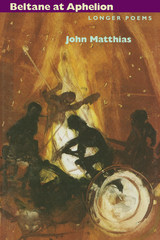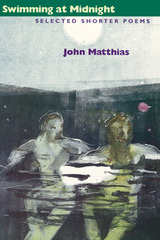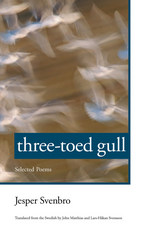
The Battle of Kosovo cycle of heroic ballads is generally considered the finest work of Serbian folk poetry. Commemorating the Serbian Empire’s defeat at the hands of the Turks in the late fourteenth century, these poems and fragments have been known for centuries in Eastern Europe. With the appearance of the collections of Serbian folk poems by Vuk Stefanovic Karasdzic, the brilliance of the poetry in the Kosovo and related cycles of ballads was affirmed by poets and critics as deeply influential as Goethe, Jacob Brimm, Adam Mickiewicz, and Alexander Pushkin. Although translations into English have been attempted before, few of them, as Charles Simic notes in his preface, have been persuasive until now. Simic compares the movement of the verse in these translations to the “variable foot” effect of William Carlos Williams’s later poetry, and argues that John Matthias “grasps the poetic strategies of the anonymous Serbian poet as well as Pound did those of Chinese poetry.”
First published in 1987, the translation of the Battle of Kosovo is now reprinted both because of its intrinsic merits and because the recent crisis in Kosovo itself compels the entire world to understand the nature of the ancient conflicts and passions that fuel it. Although Matthias and Simic have elected to retain their original preface and introduction, Christopher Merrill, a scholar of the region and author of Only the Nails Remain, has contributed a brief afterword explaining the importance of this poetry in the context of NATO’s first military action ever against a sovereign nation.

Beltane at Aphelion collects all of John Matthias’s longer poems and is published simultaneously with Swimming at Midnight, which collects his shorter poems. The volume includes his exuberant experiments from the 1960s, Poem in Three Parts and Bucyrus, followed by The Stefan Bathory & Mihail Lermontov Poems, his comedic diptych from the 1970s set on a Polish and a Russian ocean liner, and by Northern Summer, his meditation on history and language set in Scotland. It concludes with the three long poems first published in A Gathering of Ways which explore ancient paths and river routes in the East Anglian region of Britain and the American Midwest, and, in the most ambitious poem he has yet written, the famous pilgrim trails to Santiago de Compostela in Spain. About the books in which these poems originally appeared, critics and poets have written with enthusiasm.

“An East Anglian Diptych” explores those parts of Cambridgeshire, Suffolk, and Norfolk linked by three rivers and by those ancient paths and tracks known as ley lines which connect locality and locality and time with time. “Facts From an Apocryphal Midwest” explores another group of trails that began as prehistoric paths down which copper from Lake Superior was carried from the early days of the mound-builders. Despite the historical backdrop of these poems, both bring the reader into the present in unexpected ways, preparing him or her for the strange and visionary “A Compostela Diptych,” winner of the Poetry Society of America’s George Bogin Memorial Award.

Swimming at Midnight collects the short and middle-length poems from John Matthias’s earlier books together with twenty poems that have previously appeared only in magazines. It is published simultaneously with Beltane at Aphelion, which includes all of Matthias’s longer poems. The two books together represent some thirty years of his work.
The poems in Swimming at Midnight range from early lyrics written in American during the late 1960s to meditative poems dealing with historical, geographical and cultural themes deriving from Matthias’s years in England in the seventies and eighties; they include the epistolary poems from Turns, “Poem for Cynouai” from Crossing, “A Wind in Roussillon” from Northern Summer, and the formal experiments engaging issues of poetics and metaphysics for which Matthias is well known. The book concludes with a section of new poems and translations dealing both with the public world of modern history and the private experience of life in the century’s final decade. The last poem of all connects the work in Swimming at Midnight with the last of the long poems in Beltane at Aphelion.
Critics have been warm in their praise of Matthias’s work. Robert Duncan called his early poetry “the work of a Goliard—one of those wandering souls out of a Dark Age in our own time,” and Guy Davenport has said that his recent work makes him “one of the leading poets in the USA.” D. M. Thomas in the TLS admired the “virtuosity” of Turns and the way “life presses into the poems,” while John Fuller in the same journal found the poems in Crossing “bursting with a masterful intelligence.” In a long essay on Northern Summer, Jeremy Hooker wrote: “In his combination of lyrical and discursive voices, as in subject and concern, Matthias has an exciting range…He writes in some poems from a tension between a scribe’s respect for the integrity of his materials and a magician’s freedom to transform them, and in many poems he brings together the contrasting gifts and is fully present as himself, both scribe and magician.”

READERS
Browse our collection.
PUBLISHERS
See BiblioVault's publisher services.
STUDENT SERVICES
Files for college accessibility offices.
UChicago Accessibility Resources
home | accessibility | search | about | contact us
BiblioVault ® 2001 - 2024
The University of Chicago Press









